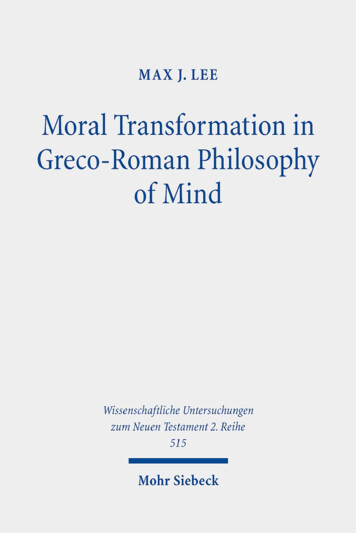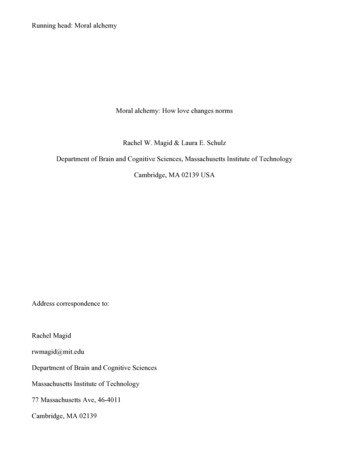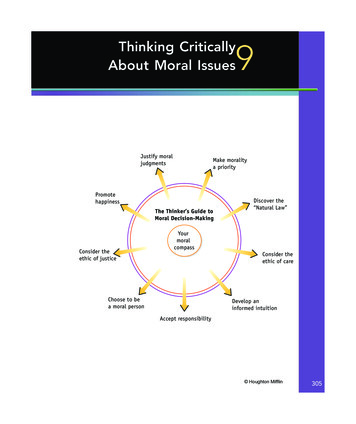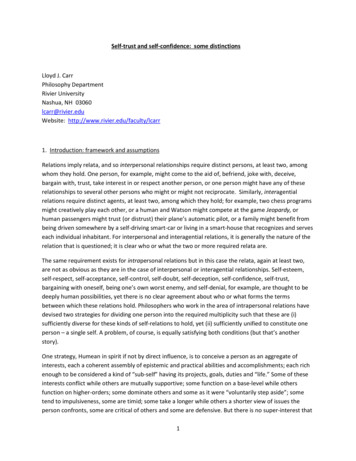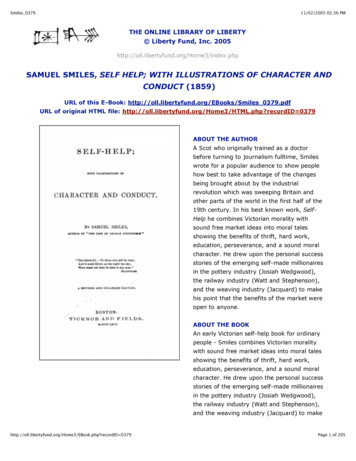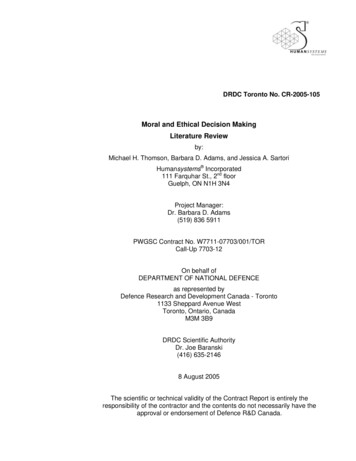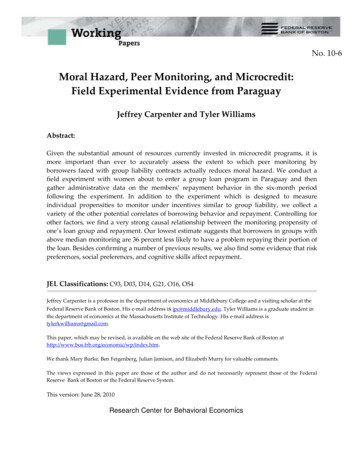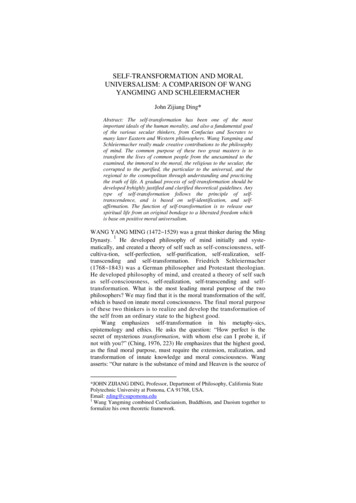
Transcription
SELF-TRANSFORMATION AND MORALUNIVERSALISM: A COMPARISON OF WANGYANGMING AND SCHLEIERMACHERJohn Zijiang Ding*Abstract: The self-transformation has been one of the mostimportant ideals of the human morality, and also a fundamental goalof the various secular thinkers, from Confucius and Socrates tomany later Eastern and Western philosophers. Wang Yangming andSchleiermacher really made creative contributions to the philosophyof mind. The common purpose of these two great masters is totransform the lives of common people from the unexamined to theexamined, the immoral to the moral, the religious to the secular, thecorrupted to the purified, the particular to the universal, and theregional to the cosmopolitan through understanding and practicingthe truth of life. A gradual process of self-transformation should bedeveloped byhighly justified and clarified theoretical guidelines. Anytype of self-transformation follows the principle of selftranscendence, and is based on self-identification, and selfaffirmation. The function of self-transformation is to release ourspiritual life from an original bondage to a liberated freedom whichis base on positive moral universalism.WANG YANG MING (1472 1529) was a great thinker during the Ming1Dynasty. He developed philosophy of mind initially and systematically, and created a theory of self such as self-consciousness, selfcultiva-tion, self-perfection, self-purification, self-realization, selftranscending and self-transformation. Friedrich Schleiermacher(1768 1843) was a German philosopher and Protestant theologian.He developed philosophy of mind, and created a theory of self suchas self-consciousness, self-realization, self-transcending and selftransformation. What is the most leading moral purpose of the twophilosophers? We may find that it is the moral transformation of the self,which is based on innate moral consciousness. The final moral purposeof these two thinkers is to realize and develop the transformation ofthe self from an ordinary state to the highest good.Wang emphasizes self-transformation in his metaphy-sics,epistemology and ethics. He asks the question: ―How perfect is thesecret of mysterious transformation, with whom else can I probe it, ifnot with you?‖ (Ching, 1976, 223) He emphasizes that the highest good,as the final moral purpose, must require the extension, realization, andtransformation of innate knowledge and moral consciousness. Wangasserts: ―Our nature is the substance of mind and Heaven is the source of*JOHN ZIJIANG DING, Professor, Department of Philosophy, California StatePolytechnic University at Pomona, CA 91768, USA.Email: zding@csupomona.edu1Wang Yangming combined Confucianism, Buddhism, and Daoism together toformalize his own theoretic framework.
80JOHN ZIJIANG DINGour nature. To exert one‘s mind to the utmost is the same as fullydeveloping one‘s nature. Only those who are absolutely sincere can fullydevelop their nature and ‗know the transforming and nourishing processof Heaven and earth.‘ Those who merely preserve their minds, on theother hand, have not yet exerted them to the utmost. Knowing the affairsof a district or a country, which is what the titles prefect and magistratemean.‖ (Chan, 1963b, 13) Heaven-given principles are the principles ofthe vital force. This vital force represents the functioning of the heavengiven principles. Without these principles there could be no functioningof the vital force and without this functioning, those things that arecalled principles could not be seen. Devotion to the essence of things(discrimination) implies mental energy and includes the manifestation ofvirtue. It signifies being undivided. It is mental energy and sincerity ofpurpose. Being undivided is devotion to the essence. It implies themanistestation of illustrious virtue. ―It is what is called beingtransformed. It is being sincere in purpose If a person steadily has thewill to be a sage, then he is able to make efforts to realize selfachievement and to be watchful over himself when he is alone.‖(Wang,1992, 1024)Schleiermacher also emphasizes self-transformation. Heindicates that the Man has undergone a religious transformation and allhis activities are differently determined and even all impressions aredifferently received, which means that the personal self-consciousnessbecomes different. ―In sofar as the personal self-consciousness has beentransformed, the actions that arise from it, too, will be different fromthose of the former self central to Schleiermacher‘s outlook was hisethical theory. It is in the sphere of ethics that religion has its ultimatemeaning, for the fruit of all true religion lies in its transformative powerover the self.‖ (Mariña, 2008, 3) For him, an individual religioustransformation really reveals that the individual self-consciousness isdifferent, and the actions will become different from those of the formerself. Human feeling can be regarded as the unity which is the point oftransition from knowing to acting. This transition is also recognized asthe consciousness of nothing, and the identity of the subject (the ego).Human life is a series of moments which is transitioned from thought tovolition. The transition is the point from which thought ceases andvolition begins, it can be considered the identity of both. If everythingfinite can be absorbed into the self-consciousness, and can form aconsciousness of community between the self and nature, it will becomethe consciousness of the absolute unity of all life. We may assume animmediate tendency toward the infinite, and try to abolish the antithesisbetween the conscious being as a genus and the being given toconsciousness in self-consciousness through self-transformation.In the history of the world, so-called self-transformation for thecosmological and universalistic purposes has been a longtime debatedtopic for religion and philosophy. Today, it is still an important issue forscholarly argumentation in our contemporary cosmopolitan age. AsShulman declares: One typological divide, then, is, that between modelsof gradual self-transformation, often built upon the active cultivation
SELF-TRANSFORMATION AND MORAL UNIVERSALISM81over years of ascesis or meditative praxis, and those of sudden or evenviolent change in the composition of the itself—for example, in religiousconversion a strong ―religious‖ assertion about the self—such as theBuddhist denial of its existence—―may color self-experience andprocesses of transformation in highly diverse culture.‖ (Shulman, 2002,5-6) We will examine the similarities and distinctions between Wang‘sand Schleiermacher‘s doctrines of the moral and universalistictransformation of self. Transformation of the self can be re-examinedthrough the following multiple perspectives.I. Wang‘s and Schleiermacher‘s Theory of SelfWhen one of his disciples hold the old theory of Zhu Xi, Wangsays:‖this would be seeking wisdom in external things.‖ This disciplereplied, ―If you regard the investigation of principle (li) of things asexternal, you belittling your mind (hsin)‖ Wang proceeded to give adiscourse on Mencius‘ chapter regarding the complete development andrealization of mind (hsin). (Ching, 1976, 86) From this story, we mayfind two key points: one is that Wang is ―seeking wisdom in internalthings; another is that he really emphasizes ―self-realization‖ and ―selftransformation.‖ Wang declares, ―By authentic self I mean innate moralconsciousness (Liangzhi).‖ (Wang, 1992, 250) Innate moralconsciousness as authentic self has been embodied, going beyondintellectual knowledge of good and evil. It contains not only awarenessof oughtness but the will to do oughtness as well. If you innately knowwhat is good, you will immediately like it just as you like lovingbeautiful colors; if you innately know what is evil, you will immediatelyhate it just as you hate bad odors—it is quite natural and spontaneous foryou to do goodness and stop evil since innate knowing, liking, andhating all ―result from authentic heart/mind.‖ (Wang, 1992, 195) Therelations between the mind and the external worldare: 1) the externalworld is dependent on the self, and there is no such world that existsbeyond the scope of the self; 2) the mind is the master of Heaven-andEarth and myriad things in the external world; 3) one‘s experiencedreality is based on an inseparable relationship between the mind and theworld; and 4) the mind and the world are coexistent and coextensive, butthe former must be the dominate and determinate one.For Mencius, ―conscience‖ originally is a transcendentally moralconcept which means to sympathize with people, to shame evil, topolitely refuse interests and to distinguish right from wrong. Wangdeveloped this idea ontologically and epistemologically, and thoughtthat Man‘s conscience is just a Reason of Heaven. He reduced a priorimoral conscience to Reason of Heaven which represents essence of theworld and also becomes primitive morality in Man‘s Mind. Heconsidered conscience the only criterion to judge good from bad, andright from wrong. Conscience exists, as a priori entity or reality, inMan‘s Mind. Man will produce right moral behaviors according to hisinternal conscience, and there is no need to search for any externalsources. Wang‘s ―Benevolence of All-in-One‖ was related to his claims
82JOHN ZIJIANG DINGof Enlightened Morality. Man is the center of all things, Man‘s mindshould be the master of heaven, earth, and spirits, and Man‘s conscienceis the conscience of all things. A saints‘ mind should treat all things ofthe world as a whole, all individual people should promote their ownconscience to the whole world, and finally save society from suffering.According to Wang, benevolence, justice, propriety, and wisdom arenaturally manifested virtues. In educating the young, he recommendedteaching filial piety, brotherly respect, loyalty, faithfulness, propriety,justice, integrity, and a sense of shame. Wang believed that all thingscan be merged into an organic whole as the form of the world is the idealpolitical order of human society. A man should love other people like heloves himself, and treat all people like he treats his own blood relativesin order to achieve a perfectly good social life. All things in one was theideal social order which means ―there is no barrier between you andme,‖ ―all Chinese people are united as one‖, and ―all people in thisworld is one family. ‖ Wang‘s thought further deepened and developedConfucian cosmopolitanism for the needs of social changes.According to Wang: 1) All universal moral laws or codes are innatein man and discoverable through self-cultiva-tion. 2) The moralawareness is finally derived from the self, and self-awareness and theunity of knowledge and action should be stressed. 3) Self-perfection is aself-realized human nature through a way of self-absorption, selftranscendence, and self-renunciation of egotistical feelings intuitivelyand subconsciously, not through knowledge, cognitive theory andinvestigation of things by Zhu Xi. 4) The real causes of human problemsor social crises are due to the fact that man cannot gain a rightunderstanding of his own self as well as his relationship to the world,and thus cannot live up to what he should be. 5) The primary quality ofthe mind (the original mind) is the ―mind in itself‖ which can beregarded as the fundamental root of moral judgment, and the secondaryquality of the mind is the applications or functions of human mind,which is equivalent to the principle of the universe; these two types ofqualities of mind really represented self-causality, self-support, selffulfillment, and self-sufficiency. 6) Ontologically, there are nosignificant distinctions between the mind in itself and the human mind,because they are revealed through self-consciousness. 7) The externalworld exists as the directed operation of the mind, which means that ourknowing about all things through observation, sensation, and experiencemust be finally associated with the mind; in other words, the world is aninseparable part of the mind, not an independent entity external to it. 8)The salvation of the society and the world from ―selfish desires‖ must bethrough personal moralization or self-purification, and all moralizedpersonal conducts and social activities are finally established in theexpansion of self-realization to respond correctly to the world. Feng Yulan criticizes: ―Some neo-Confucians practice self-cultivation in thepursuit of domestication responding to external things, as if it werepossible to be domestic to any external thing. Therefore, their learning isempty and useless, which is a big mistake of neo-Confucians.‖ (Feng,1985, 663) We may make a meta-philosophical examination on Wang‘s
SELF-TRANSFORMATION AND MORAL UNIVERSALISM83mind and self, as Chung-ying Cheng says: from these general metaphilosophical reflections on Wang‘s philosophy of mind as a whole, it isnot difficult to see that his philosophy mind indeed a unity of experienceand method, a unity of description and prescription, and a unity ofcognition and performance. ―All these unities are only to be explainedby the creative insights of Yang-ming into mind and reality, and to beconceived as a creative agency, which leads to many importantphilosophical theses, which cannot be otherwise understood, as well asto fruitful answers to many philosophical problems which cannot beotherwise formulated.‖ (Cheng, 1973, 49)Wang summarizes: 1) If one refers only to the place it occupies, it iscalled body; if one refers to the matter of control, it is called mind; if onerefers to the activities of the mind, it is called purpose; if one refers tothe intelligence of the purpose, it is called understanding; if one refers tothe relations of the purpose, it is called things. If one wishes to make thepurpose sincere, it is necessary to correct the purpose, expel passion, andrevert to natural law with special reference to the matter on which thepurpose is fixed. 2) The mind itself is the embodiment of principles.When the mind is free from the obscuration of selfish aims, it is theembodiment of the universal principles of heaven. When service toparents emerges from the mind characterized by pure heaven-givenprinciples, we have filial obedience; when service to a prince emerges,faithfulness; when the making of friends or the governing of the peopleemerges, sincerity and benevolence. It is only necessary to expel humanpassions and devote one's energies to the eternal principles. 3) In orderto keep one's self under the restraint of rules of propriety, it is necessaryto have a mind completely under the influence of heaven principles. If aperson desires to have his mind completely dominated by heavenprinciples, he must use effort at the point where principles aremanifested. 4) If it is not corrupted by human aims and passions, it iscalled an upright mind, and if corrupted, it is called a selfish mind. Whena selfish mind is rectified it is an upright mind; and when an uprightmind loses its rightness it becomes a selfish mind. 5) In a position ofwealth and honor to do what is proper to a position of wealth and honor,in a position of sorrow and difficulty to do what is proper to a position ofsorrow and difficulty, implies that one is not a mere machine. This canbe accomplished only by the man who cultivates an upright mind. 6) Thenourishing of virtue and the nourishing of one's body are essentially thesame thing. 7) When you cease to regard those external things, theybecome quiet in your mind. When you see them, their colors at oncebecome clear. From this you can know that these flowers are notexternal to your mind. 8) Virtues and moral purposes objectify andrealize themselves through self-demonstration. 9) Man alone knowswhat is meant by being enticed by the influence of things, but is unableto carry on self-investigation with full sincerity or to carry outvigorously the law of reciprocity. He stops with recognizing his body asthe person and external objects as things, and forthwith separates thingsand himself into two distinct realms, so that in the last analysis his
84JOHN ZIJIANG DINGperson represents but one thing among ten thousand cosmologically anduniversally.Mariña says ―Despite the importance of Schleiermacher‘s ethicaltheory, it has received little attention in the English-speaking world.‖(Mariña 2008, 13) His highly original contribution to ethics lies in hisunderstanding of ―(a) what constitutes individuality, (b) how languageand social institutions shape self-consciousness, (c) the relation of theindividual to the community, and (d) the way that individuals andcommunities can be the occasion for self-transformation [my italics]‖(Mariña 2008, 221). Schleiermacher defines religion as the totality of allrelations of man to the deity, in the Universe, as he feels it to be animmediate part of his own life. After continueing progress, this feelingbecomes more conscious from the lower to the higher and finally to thehighest level. For him, the organization of nature, as becoming, is thehistory of nature, and the organization of mind, as becoming, is thehistory of culture. He writes: ―If transcendental philosophy and thephilosophy of nature are to be the eternally contrary but entirelycorresponding views, then the philosophy of nature must explain thereality of the ego for the external world, just as the transcendentalphilosophy explains the reality of the outer world for the ego.‖ (Brandt,1968, 156) The examinations of transcendental subjectivity andtransformative reality of the ego (self) are the dominant parts ofSchleiermacher‘s transcendental idealism. The self-consciousness is oneof the key ideas of Schleiermacher‘s philosophy. We should clarify selfconsciousness, and provide a comparative study for Wang‘s andSchleiermacher‘s transcendental subjectivity and self-consciousness.Schleiermacher discloses that feelings, desires, and moral consciousnessrooted in the conative side of human nature can play an important role inthe ethical expression of the self. His transcendental ethics justifies bothgenuine freedom and the unity of an agent‘s character throughout theprocess of moral transformation. For him, any intention to mediatebetween science and religion must find a solution to the issue of humanconsciousness, which is our window to the world, however we mayconceive it. The path to reconciling a scientific naturalism rejecting anypossibility of transcendent meaning and a reactionary fundamentalismthat advocats possession of absolute truth is based on an investigation ofthe nature of the subject, its relationship to the world, and the possibilityof its relationship to a ground transcending both self and world.Schleiermacher‘s theory focuses on: 1) The study of transcendentalsubjectivity is an analysis of the possibility of knowledge from finitesubjectivity to infinite subjectivity, and also of the possibility of moraltransformation from imperfection to the most universal perfection. 2)Philosophy starts with the ―finite nature of man,‖ but religion starts withthe Infinite; for this reason, we must leave room for mysticism beyondthe limits of philosophy. 3) The Universe is in unceasing activity, andreveals itself to human being every instant. 4) One‘s organs mediate theconnection between he and the object, and produce a change in his innerconsciousness. 5) The subjective part in the expression of one‘s ownintuition of the Universe is to constitute its essential truth and vitality,
SELF-TRANSFORMATION AND MORAL UNIVERSALISM85and the freedom of the highest intuition is to consist in this particularityand having something for oneself. 6) Every rational individual, as ―finitesubjectivity,‖ is assigned his definite place in a moral world order. 7) Allacts of knowledge are conditioned by the inherently particular andsubjective standpoint from which they first originate; all truly ethicalacts must proceed from the awareness of the limited and perspectivalcharacter of the self; and all virtuous characters must be grounded in theself‘s relation to the transcendent. 8) The inmost being of man‘s mindmust reach everything that belongs to his life; everything which is to becontinuously active in the human mind is far beyond the realm ofteaching; and every creation of the human mind can be examined andcomprehended from its inner essence as a product of human nature. 9)Ethics proceeds from the consciousness of freedom, seeks to extend itskingdom to infinite, and make everything subordinate to it. 10) Theforce which pures itself forth in the matter of nature is essentially thesame as that which manifests itself in the world of mind. 11) So-calledreligious feeling is made inward and absorbed into the inner unity ofmind and man‘s life and being. 12) Religion is regarded as the totalityand universality of all relations of man to the deity in the Universe.II. A Conceptual Examination of Self-transformationBoth Wang Yangming and Schleiermacher made very thoughtfulconceptualization or abstraction for their terminological system andtheoretical frameworks, and reformalized, reinterpreted, andreconstructed certain basic concepts and structures of their doctrines ofmind and self which were not as exactly uniform as had beenassumed.By following Confucius‘ semantic methodology, Wang wasapplying Zhengming (rectification of names) to the conceptualization ofhis system. The rectification of certain terms such as the mind, self,virtues, and knowledge is aimed at the real meaning, understanding andusage of the whole framework. Wang maintains: ―What cannot beobscured nature in it is the manifestation of the highest good, andconstitutes the illustrious virtue in its original state which is I also what Icall Liangzhi (the innate knowledge). When the highest good ismanifested, right is right and wrong is wrong. To things trifling orimportant, significant or petty, it responds and reacts with unceasingtransformation (my italics), yet in everything attaining to the naturalmean. ‖ (QGL, 206) We may find two key points: 1) the highest good ismanifested through Liangzhi; and 2) this manifestation by Liangzhi is―unceasing transformation.‖ Liangzhi which literally means ―goodknowledge‖ is one of the most important concepts of Wang‘s theory ofself. Wang considers Liangzhi as ―the drop of blood transmitted fromantiquity by the sages,‖ In a poem, he expresses this point again: ―thesage‘s instruction lasted a thousand rears; Liangzhi is its oraltransmission.‖ (Wang, 1963, 630A)Wang's view was derived from Mencius‘ idea, ―The abilitypossessed by men without having been acquired by learning is innateability, and the knowledge possessed by them without deliberation is
86JOHN ZIJIANG DINGLiangzhi. ‖ (Mencius, 7A.15)Moral actions are relevant to the endeavorof self-cultivation, Liangzhi relates to substance that is indispensable tothe endeavor of self-cultivation, there is no distinction between theexternal and the internal. Virtues produce an identical self to guidevarious actions responding to various situations. Liangzhi demonstratesitself in different moral actions in accordance with diversified socialrelationships and situations. The relationship between innate moralconsciousness and moral actions is therefore in a form of one controllingmany. Innate moral consciousness constitutes the authentic self. Whileprinciples of Heaven are external and alien, innate moral consciousnessas virtues represents mostly self-demands of a moral agent. When amoral agent follows innate moral consciousness, he is acting at his ownfree will. Considering acting in accordance with innate moralconsciousness is a process of the realization of self-satisfaction. Aperfect action lies in the unity of the obtainment of propriety and therealization of self-satisfaction. The significance of emotions to innatemoral consciousness embraces reason, emotions, and will at the sametime. For Wang, a moral action springs from nature with the presence ofemotions which are rooted in innate moral consciousness: ―Whenaroused naturally, all seven emotions are the functions of innate moralconsciousness.‖ A perfect moral action is an action of selfconsciousness, free will, and nature. (Wang, 1992, 195)The better translation for Liangzhi could be ―moral consciousness,‖―self-consciousness,‖ or ―innate moral consciousness.‖ 2 This one is alsoa key concept of Schleiermacher‘s theory of self. Wang declares that2Liangzhi has the following characteristics: 1) it is defined as the nature whichHeaven has conferred on us, and the original state of our mind, which isspontaneously intelligent and keenly consciousness; 2) it is the instinctive humansense planted within us by nature; 3) it is imbedded in one‘s conscience, anddemonstrated by the instinctive love or the form of omnipotent love in itsoutward expression; 4) it has a priori and transcendental and original substanceof mind-in-heart; 5) it automatically comprehends any ideas; 6) it does not comefrom the five senses, and the five senses are functions; 7) it is man‘s own moralcriterion in one‘s mind-and-heart, and may be called sagehood; 8) it is innate,intuitive, and transcending; 9) it means that all man have an innate moral abilityto provide moral judgements; 10) it is only real knowledge, and there is no otherknowledge beyond it; 11) it is ―Dao‖ of morality; 12) it is guided by HeavenlyReason, Heavenly Rules, and Heavenly Mandate; 13) it is innate moralconsciousness or intentions for justifying the good or bad, and right or wrong;14) it is the starting point of ethical practice, and constitutes man‘s real self; 15)it is to apply self-cultivation to reject ―immoral consciousness‖ and develop―moral consciousness‖; 16) it is inner source of moral guidance, can be simplyapplied to human conduct or society irrespective of the circumstances, and canalso understand and make perfect judgments about things without muchinformation; 17) it is a perfect potential power and intuitive enlightenment in themind which can be activated anytime; 18) it can manifest the original mind thatis equivalent to the universe; 19) it represents the universal moral law as thefoundation of man‘s moral judgments; 20) If it is clear, one can either try toattain truth through quiet reflection or through efforts made in the midst ofactivity; and 21) it can be characterized by the knowledge of good and evil.
SELF-TRANSFORMATION AND MORAL UNIVERSALISM87even if the whole world says that his actions do not measure up tohis words, he would still act according to Liangzhi. In a series ofpoems about Liangzhi, Wang praises: Confucius resides in everyman‘s hsin (mind/heart), hidden by distractions of ears and eyes. Thereal image being now discovered, doubt longer Liangzhi. Why, sir, areyou always agitated, wasting efforts in the world of sorrows —Know you not the sages‘ occult word, Liangzhi is your Cantong Qi(Tsan-tung Chi). 3 In everyman there is a compass, his mind-and –heart the seat of a thousand changes. Foolishly, I once saw things inreverse, leaves and branches sought I outside. ―The soundless,odorless moment of solitary self-knowledge, Contains the ground ofHeaven, Earth, and all beings. Foolish is he who leaves hisinexhaustible treasure, with a bowl, moving from door to door,imitating the beggar. ‖ (Wang, 1963 20, 629a) Towards the end ofhis life, Wang expressed again in a poem the fulfillment of all hisdesires in the discovery of Liangzhi. It presents a summary of hispersonal evolution: ―Transmit arts difficult and complex/In me isQian (Heaven), in me Kun (Earth); I need not seek elsewhere—thethousand sages pass as shadows; Liangzhi alone is my guide.‖(Ching, 1976, 158) Conceptualization of Wang‘s self is based onthe Six Classics, which are constant Dao in his mind, because the―Way‖ can penetrate persons and things, reach all lands, fill upHeaven and Earth, go through past and present, comprehend all thatexists, and is identical to all that exists without cha nging anything.His moral consciousness is innate, the supernatural, the infinite, thetranscendental, the immediate, the highest, and absolute.Schleiermacher‘s views are based on a rigorous metaethical analysisof the individual‘s relation to the divine or the absolute; the character ofself-consciousness and personal identity; the relation of the self to othersand its effect on self-consciousness; and the specific character ofindividuality and its relationship to the formation of the ethicalcommunity. (Mariña 2008, 7) Any movements of mind or self must bedeveloped from feeling to consciousness from the lower to the higher,and from the immediate to the mediate through the different stages ofconceptualization. (Schleiermacher, 1958, 65) Thought can occur only inthe form of concepts or judgments, and the foundation of all thought, asknowledge, is the relation of thought-form and sense data. Conceptualthought is embodied in speculative science which consists in a system ofthought exhibiting the relationships of the essences of the various typesof reality. The system of all concepts constituting knowledge must bereduced to one Reason, which animates all individuals in a timeless way,as the source of true concepts in which God is the source of all livingforces. Schleiermacher asserts that when man seeks through ―selfconsciousness to enter into fellowship with the unity of the Whole, thefinite resists him, and he seeks and does not find and loses what he hasfound. He is defective, varuable and attached to details and non3Cantongqi is the main Chinese alchemical scripture written by the alchemistWei Boyang in 142 AD.
88JOHN ZIJIANG DINGessentials.‖ (Schleiermacher, 1958, 242) Similarly with Hegel, hisconceptual transformation follows thesis—antithesis—synthesis.Antithesis could be divided into the lower, the higher and the highest.Body and soul in man is the highest tension of antitheses, and the mostuniversal antithesis is that of Ideal and Real. The function of the idea
of mind. The common purpose of these two great masters is to transform the lives of common people from the unexamined to the examined, the immoral to the moral, the religious to the secular, the . transformation of innate knowledge and moral consciousness. Wang asserts: ―Our nature is the substance of
